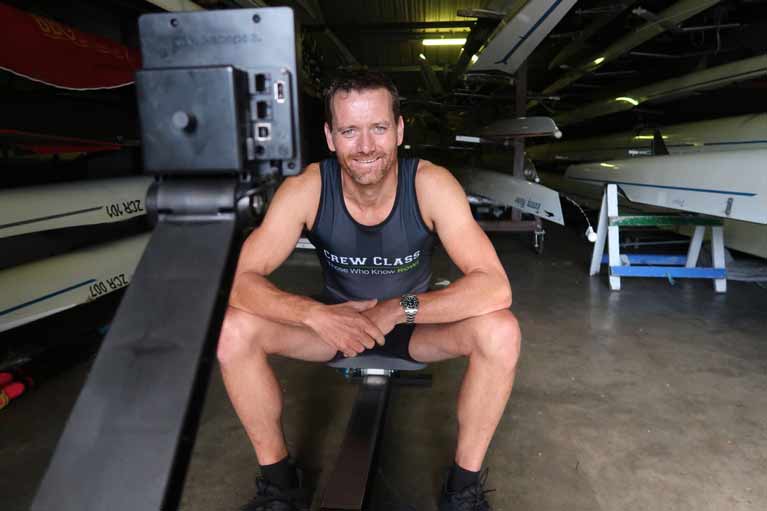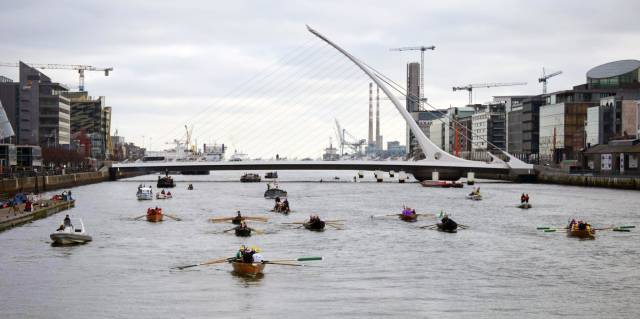Niall O’Toole, the first Ireland world champion in Olympic-class rowing who now runs indoor rowing courses, remembers fondly how he was invited to race in a boat class that goes back over a century.
Cracking the Code of East Coast Skiff Racing
By Niall O’Toole
It was a dreary November night. A green army of St. Patrick’s singlets filed into the room. I wanted to make a good first impression before our first indoor rowing session began. I proceeded to introduce myself. “Hi Guys, I’m Niall O’Toole, three-time Olympian, world champion, former world record holder and multi world medallist”. A deadly silence swept through the room. I didn’t hear any expletives, but their faces said it all.
Three months passed before there was any glimmer of recovery. Then, came the request: “Would you like to race skiffs, Niallo?”. I expected to go through a data-driven, seat-racing selection process, but discovered that crew selection was considered more an art form than a science. In quiet corners, canny, skiff insiders decide the fates of crews, as they have done since the late 19th Century, where the tradition of ‘Hobbling’ first began. Back then skiffs raced for piloting rights to cargo ships. Now the tradition of racing skiffs continues. So it was that I joined my first skiff crew and started training.
 Niall O’Toole
Niall O’Toole
The first thing I noticed was the beauty of the boats. I was used to brittle carbon fibre Olympic missiles, built to specific weights and criteria, which seem dull and lifeless by comparison. Skiffs are living, breathing works of craft, ever-changing over time and lovingly maintained by obsessive boatmen; men like my late father Jimmy O’Toole. He was a shipwright for Guinness on the Lady Patricia, which brought crates of the black stuff to Liverpool. He built and repaired many wooden boats in his time, including one in the back garden of our terraced house, which turned out to be too big to get out. Fifteen hedges, fences and brick walls later, he slotted it out through a break between two houses.
Being surrounded by wooden boats again brought back fond memories of my Dad. I’m still none the wiser about what clubs deem a ‘fast’ or ‘slow’ boat’, though.
Crews grow comfortably accustomed to their skiff’s quirks, and are suspicious of change. A new boat into the club can find itself labelled ‘slow’ and relegated to life on a rack. The mythology around oars is unique too – no two wooden oars are exactly the same. Weight, stiffness, size of blade, handle-width and grip all play into making the perfect oar for any one individual’s taste. It took me weeks to find an oar that gripped the water the way I liked. I marked it with tape to make it easy to find again, but found that tape is easily removed and an oar easily hidden. I’ve seen many a ruckus on the dock over an oar that found itself favoured by two crews.
My first race for St Pat’s was in Dun Laoghaire. A stalwart of the club, Philip Murphy, whispered in my ear: “It’s rough out there Tooler! Make sure you get water.” I wasn’t sure what he meant. Due to the rise and fall of the boat, it was impossible to adjust your hand position enough to stay in contact with the water. Pulling air doesn’t give you boat speed, but we managed to lead the race into the first turn.
Prematurely, I saw myself adding another notch to my glittering rowing career, when amidst the whirlwind of cox’s screams, burning lungs, and the strength-sapping manoeuver of trying to use my oar as a handbrake to swing the boat around, we exited the turn in second-last place. We tried to pick up the pace, but the water was just too big to make up any of the ground we’d lost. Then we rounded the second buoy to find a rogue skiff on a bad line coming straight for us. I ducked and heard an almighty crack. ‘Skipper’, my crewmate, was clocked with an oar to the head and knocked clean out, hitting the bottom of the boat with a thud. Stuff like that just never happens at the Olympics!
I spent the next couple of months learning the subtleties of the sport; learning the craft, culture and code. It’s not all about straight-line speed - you do need to be fit and fast, but it’s also about currents, streams, winds, waves, tides and a little help from lady luck. It’s about your cox finding the fastest racing line and your crew communicating around the turn with their lungs on fire. I came to realise that the physical exertion and pain you feel in skiff racing is every bit as tough as the Olympic sport I know. Most importantly, I learnt that St. Pat’s is truly a community based club; in that humble old Dublin, no-nonsense kind of way. In a club where people truly look out for each another, I found a warm welcome, a sense of place and lifelong friends. In the twilight of my rowing career, I had no idea that was possible.
The All In A Row charity event will be held on the Liffey on Saturday, November 30th. Rowing, kayak and canoe clubs along with private rowing boat owners can be part of a 10-hour row/paddle to raise money for both the RNLI and The Irish Underwater Search and Recovery Unit. The boats will travel from St Patrick’s Rowing Club at Tom Clarke Bridge (formerly East Link Bridge) to Heuston Station Bridge and to the Grattan Bridge during high tide. During low tide it can be viewed along the banks of the Liffey.































































